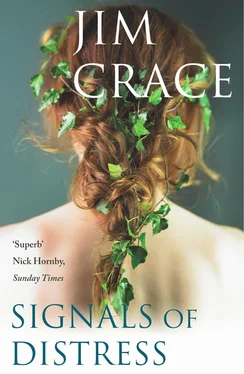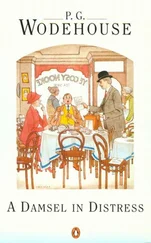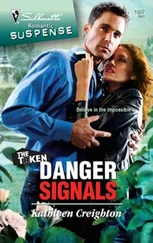The mate had chanced his arm with Mrs Yapp. He’d put a hand across her back when she’d reached over for the empty pie dishes. She hadn’t seemed to mind. He’d try again — and somewhere fleshier. ‘Don’t organize a search if my bed’s empty for the night,’ he said. ‘I’ll be in safe hands.’ The sailors laughed in unison at that. The mate was always claiming conquests, though he wasn’t equipped to be Lothario. His nickname on the Belle was ‘Captain Keg’, perfect for his size, his shape, his hollow self-importance and what mostly he contained, gas and beer. The only reason Mrs Yapp hadn’t pushed his hand away was because the mate was too much a gargoyle to be threatening, particularly in that low, unsteady light of oil lamps.
If any man there was equipped to win the admiration of women it was the straw-haired deckhand, Ralph Parkiss. He was nineteen, tall and beautiful. This was his first trip on the Belle — and at least some of his adolescent softness had — so far — survived the rough life of the decks. He was not the hardened sailor yet. He had the kind of easy, guileless smile that could turn ice to steam.
‘That Mrs Yapp hasn’t even noticed you,’ one man told the mate. ‘She’s only eyes for baby Ralph. She hoped it was his hand across her butt, not yours.’
‘You keep off, Ralph,’ the mate said. ‘The lady’s mine!’
‘There’s younger and there’s finer down the coast!’ Ralph Parkiss defended his embarrassment by deepening it. ‘I’ve found myself a sweetheart already.’
‘Who is she, Ralph? A she-goat or a ewe?’
‘I know her name is Miggy, and she’s a fine sight. That girl down on the beach when we were rowed ashore, the one that had our ensign round her throat …’
‘The one dressed like a fellow, Ralph? You’d best find out what’s hidden in her breeches before you buy the ring.’
‘I will find out. If I’ve the chance.’
‘You better had. A cork’s no good without the bottle.’
They drank another toast, ‘To Ralph and Miggy. Long may he sail in her!’ They banged the trestle with their pots. They shouted to be heard. They coughed, and laughed, and thanked the heavens that the Belle , with them aboard, had not gone down at sea.
Next door the parlour company was less jubilant. The five oldest sailors talked quietly at one end of the table, uneasy in the company of the sandy-haired woman and the two dull-looking men, and wary of the captain. He introduced himself to Aymer, and tried to reassure the Norrises that the Belle would soon be fixed and heading off, with them aboard, for Canada. ‘There’s not a ship afloat that could have ridden out that storm last night and not had damage done,’ he explained.
‘You have no need to give the details of the storm,’ said Aymer. ‘I was at sea last night myself. I cracked a shoulder bone.’ He didn’t want to say to the captain that he had tumbled from his bed. ‘I fell across the deck when we were struck and scarcely kept aboard.’
‘You’ve been baptized then, Mr Smith …’
‘No, Captain, I’m a Sceptic.’
‘… and need not fear the sea again. You’ve sea salt in your blood.’
‘We have no need to fear the sea at all, I think. And as for sea salt in my blood, then that is true of all of us, whether we be sailing men or Hottentots.’ He gave the captain time to contradict, and set a thoughtful profile for Katie Norris. ‘I speak, of course, about the chemistry of blood. It is not much known, but the elements of calcium, potassium and sodium are found in equal rations in our blood as in the oceans.’ He sought a metaphor that was grand enough, and memorable: ‘Our veins are tides. Our blood is brine. The organisms of our blood …’ (are fish, he’d meant to say. But this would strike a comic note) ‘… are common to us all. The grandest captain of a ship, the meanest Negro slave, are both ancestors of the seas. What is your view?’ He hoped the captain had the brains to take the hidden meaning.
‘My view is, Mr Smith, that I leave chemistry to chemists. And they, I hope, will leave me well alone and let me go about my business. That’s all that any man can ask.’
‘That is exactly what we seek in Canada,’ said Robert Norris, seeking something else as well, to keep the evening civil.
‘You’ll find it, sir, so long as you’re not frightened of hard work, plain food … and ice! They’ve winters there that make the weather here seem tropical.’ The captain called along the table to a stringy, grey-haired sailor, the one whom Walter Howells had hauled out of the sea that day. ‘John Peacock, tell these good people that tale we had the other night, about the frozen boat.’ Anything to keep Smith quiet!
John Peacock put his pipe down on his plate and, winking at his comrades, commenced with ‘It was last October and …’ He told — in fixed and tested sentences which seemed as mannered as a psalm — how two brothers from below Quebec agreed to row a gentleman from Boston across the St Lawrence to the southern bank: ‘They should’ve known better. At that time of year! But they couldn’t refuse the fare he’d promised them. They’d end up rich, and wouldn’t have to row a boat again, except to get back home. And why go home when you are rich? They got midstream. And then they felt the tugging on the oars and something banging up against the boat. They thought it must be beavers, snapping at the wood. A beaver’s got more tooth than brain. But it was ice. And ice with teeth that’s worse than beavers’ teeth. It lay hold of the keel. And all their rowing, all their prayers, all their cursing language, couldn’t get them to the bank.’
The Norrises were grimacing, not sure how seriously to take the sailor’s tale. The talk of storms and ice was not encouraging.
‘Perhaps we’d better take a passage to Australia,’ said Katie. ‘They’ve no ice there.’
‘There’s ice-mountains floating in the Tasman Sea,’ said Aymer. ‘You should read the journals of Captain James Cook or Sir Joseph Banks. They had their share of bergs off Botany Bay …’
Comstock hushed Aymer with the flat of his hand (the selfsame hushing gesture that Matthias, his brother, used) and said, impatiently, ‘Listen, sir, if you will. He’s not done yet. Come on now, John. Let’s hear the end of it.’
‘The end of it is that the brothers’ boat was frosted into solid water, so suddenly they hadn’t any chance of being saved,’ continued John Peacock, looking Katie Norris in the face.
‘Why did they not simply walk ashore on solid ice?’ asked Aymer. He would not be an uninquiring listener.
‘Like penguins, sir?’
‘Why not, indeed?’
‘Because their hands were frozen to the oars and — excusing me my language, Captain, and the lady — their backsides had iced on to the boat …’
‘Then why not shout for help?’
‘Ah, when they opened up their mouths, to cry for help, as you advise them, Mr Smith, their tongues and lips were welded by the cold.’ He pointed at the Norrises. ‘You’ll need to watch for that when we set sail for Canada. Best not to talk on deck.’ For once the laughter from the parlour matched the drunken din in the Commercial. ‘Their families drove a cart and horses out on the ice to rescue them. They lit a fire — midstream — to thaw them out. But that hard river ice did not give way. Nor did the boatmen or their passenger begin to melt. It wasn’t till mid-March that the ice released the boat. And then it went downstream towards the sea before it could be saved.’ He held a finger to his lips. ‘It isn’t over yet.’ He picked his pipe up, drew on it to keep the tobacco burning. He made the silence at the table last. He took his time. He much preferred to smoke than talk.
Читать дальше












